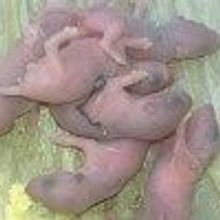Login
Subscribe404
Not Found
Is this what you were looking for?
tag histology disease medicine evolution

AI Uses Images and Omics to Decode Cancer
Amber Dance | May 1, 2019 | 10 min read
Machine learning can analyze photographs of cancer, tumor pathology slides, and genomes. Now, scientists are poised to integrate that information into cancer uber-models.

Track Your Package
Amber Dance | Jun 1, 2011 | 7 min read
How to follow stem cells transplanted into living tissue.

The Inside Guide: The Gut Microbiome’s Role in Host Evolution
Catherine Offord | Jul 1, 2021 | 10+ min read
Bacteria that live in the digestive tracts of animals may influence the adaptive trajectories of their hosts.

A Pioneer of The Multiplex Frontier
Rashmi Shivni, Drug Discovery News | May 20, 2023 | 10 min read
George Church is at it again, this time using multiplex gene editing to create virus-proof cells, improve organ transplant success, and protect elephants.

Immunotherapy Treats Fibrosis in Mice
Alejandra Manjarrez, PhD | Sep 15, 2022 | 4 min read
Researchers report that vaccination against proteins found on profibrotic cells reduced liver and lung fibrosis in laboratory rodents.

Bespoke Stem Cells for Brain Disease
Nsikan Akpan | Jan 14, 2013 | 3 min read
Scientists use virus-free gene therapy on patient-derived stem cells to repair spinal muscular atrophy in mice.

Large Scientific Collaborations Aim to Complete Human Genome
Brianna Chrisman and Jordan Eizenga | Sep 1, 2022 | 10+ min read
Thirty years out from the start of the Human Genome Project, researchers have finally finished sequencing the full 3 billion bases of a person’s genetic code. But even a complete reference genome has its shortcomings.

Week in Review: June 16–20
Tracy Vence | Jun 20, 2014 | 2 min read
Early Neanderthal evolution; developing antivirals to combat polio; the mouth and skin microbiomes; insect-inspired, flight-stabilizing sensors
Galapagos lab
Charles Choi(cqchoi@nasw.org) | Aug 11, 2003 | 3 min read
Joint effort will create molecular biology facility on evolution's islands

Genetic Mutations Can Be Benign or Cancerous—a New Method to Differentiate Between Them Could Lead to Better Treatments
Ryan Layer, The Conversation | May 27, 2022 | 5 min read
Tumors contain thousands of genetic changes, but only a few are actually cancer-causing. A quicker way to identify these driver mutations could lead to more targeted cancer treatments.